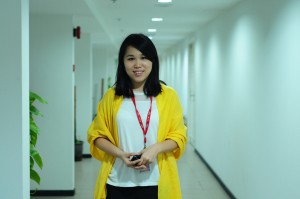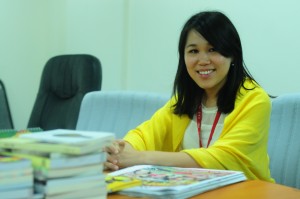“How to define women’s rights? The right to have a decent job, a decent pay? Equal life conditions as men? I guess we are requesting the same condition as men are having, or at least to be at the same level of competition with men.”
 Draping herself in a bright yellow scarf—the Bersih hue, as bright as her charisma—Wong Shu Qi, or Suki as she is fondly known, paints self-assuredness onto her canvas of political views.
Draping herself in a bright yellow scarf—the Bersih hue, as bright as her charisma—Wong Shu Qi, or Suki as she is fondly known, paints self-assuredness onto her canvas of political views.
Suki, a staunch Johorean, divides her time between her role at the DAP national headquarters in Pudu as an DAP executive secretary for political education, with the weekly party activities at her branch in Kulai.
She strongly advocated the demonstrations in Pengerang, fighting with the residents against the upcoming RAPID project. In one of her weekends in Kulai recently, Suki was part of the committee of a fundraising dinner organised DAP Selang branch and DAP for Parliament of Kulai.
It was one of the series of successful fundraising dinners in Johor, with full house attendances all around—already an uplifting feat, signifying increasing support for Pakatan Rakyat down south.
Her views on women’s rights issues are equally energetic. “How to define women’s rights?” Suki begins. “The right to have a decent job, a decent pay? Equal life condition as men, or not? I guess we are requesting the same condition as men are having, or at least to be at the same level of competition with men.”
More Working Women, Please
Acknowledging the fact that Malaysian women’s performance in workforce is still not on par with those of developed nations, Suki points out the two recurring reasons: family factor and traditional values. “Women are ‘requested’ by the society, as a mother and a wife, to take care of the family.”
“But today, women can be good leaders at work, and in the public life as well. They are ‘burdened’ by that,” Suki continues. “It’s exactly like the Mandarin saying: ‘a candle burnt at both ends’.
The dilemma lies in whether or not the government should intervene in what is perceived as private realms. Suki believes that it should be a balance of both, and she agrees that the government should assume responsibility to take care of its citizens, and in this case, the women.
In this light, the falling figures in female participation in the workforce should get any concerned government questioning: have we done enough to close the gender gap?
The alarmed Suki is persistent that women should be encouraged on going back to their jobs and persuaded to re-join the workforce. By doing so, however, Suki reminds, that by doing so doesn’t mean that they’re abandoning their families.
It is never too late to re-invite females back in the workforce, in particular the highly educated ones. Space should be given for them to cater, improvise and balance their family-related concerns.
“We are now wasting our female work force. Highly educated ones, especially. We should fully utilize female talents,” Suki suggests. “We need flexible working policies for instance tax-cuts, or incentives to corporate companies providing flexible working time for women and childcare centers—and not only for women, but for men who want to take care of their children.”
On Pakatan Rakyat’s Malaysian Women Agenda, Suki is optimistic that the coalition is doing its best to take into serious account family network support. For instance, Pakatan Rakyat’s policy of implementing 90 days of maternity leave and 14-day paternity leave is already being emulated by Barisan Nasional state governments.
“I think it’s a good trend. It shows competition between the political alliances and we should provide friendlier policies for our people. We don’t mind Barisan copying from us.”
Female Participation: Challenges, Perks?
 Suki takes pride in the increasing female voice in the public realm today. Taking the progressive stand, she believes that more can be done. “You’ll find that more women are more outspoken and daring today,” describes Suki.
Suki takes pride in the increasing female voice in the public realm today. Taking the progressive stand, she believes that more can be done. “You’ll find that more women are more outspoken and daring today,” describes Suki.
She suggests more political education to empower women to use their life skills and knowledge in order to become better and well-equipped local leaders.
It is still a male-orientated political field, Suki admits. “I remember during my earlier days, I found myself in a function which was full of black-and-white clothed men. They spoke as if there were no women around. Yes, you have to adapt to that. Many women will find it quite intimidating. But things are definitely improving.”
A self-professed feminist, Suki finds it uncomfortable to be related to female-only issues and activities, stressing that female leaders in general should be in charge of the same concerns that men are.
Suki also comments on the relevance of women’s wing in political parties, asserting: “We need the Women Wing to help raising women’s awareness in politics and to increase participation in politics.”
Believing that the women’s wing should be as temporary as the suggested quota to encourage women participation in politics, Suki responds firmly: “Once we don’t need it, we should abolish it. The quota is never supposed to be a permanent one.”
Female participants in politics face one clear obstacle, according to Suki, and that is time.
“For our married female members,” Suki adds, “Especially when they need to take care of their children, it’s quite difficult. Even our elected representatives are facing those problems.”
Joining and working in politics, however, was not her first option. As a student majoring in Journalism and Political Studies back in Taiwan, Suki sees her future in journalism, and once she returned to Malaysia, that was what she ventured into.
“However, after talking to some political leaders during my time as a journalist, one of them being my current boss now, Anthony Loke, I felt inspired.”
“I have always felt that my journalist job can’t fulfill my vision—it’s not that I’m not satisfied with the journalism field—but “I don’t want to be only as a person who writes, standing only as a medium,” Suki says. “I just felt that I could do more for the country, for the people.”
We Shall Not Waste Anymore Talent
Suki’s mother was against her returning home, telling her to remain in Taipei, and to find a job there. “She cited safety reasons: ‘it’s not safe here, the rape cases happen daily, don’t come home,” Suki tells us. “But after the 2008 elections, my mother changed her mind: ‘if you want to return, then come home.’ I came back in September 2008.”
Suki sees this as a shine of hope starting to radiate amongst Malaysians, post-2008 political tsunami. “Not only young people, but even for older people: they are finally seeing the hope for the nation—after 55 years! Finally, there’s hope.”
It’s heartbreaking to see talents flee to foreign countries, refusing to contribute to betterment of the country. But Suki is confident that things are going to be otherwise. “Yes, it seems that they’re voting this government out by foot. It’s not going to be like that anymore. We can lead a good life here.”
Changes must be done in order to realize that hope. And as for Suki, reform is impossible to ignore, especially with regards to the institutions in the country. “Because the most important thing for Malaysia is structural reform. We need to reform our government structure, agencies,” Suki explains.
“We’re not talking about cutting the number of existing staffs, no. We must make full use of the huge civil servant force. Make them more competent. I guess they would love to be better, as well. I mean, who does not want to be good and chooses to be bad?”
Indeed, to educate people to foster ties and develop greater respect towards differing identities, in this case, gender, is a long-term achievement, Suki realizes. “We need to teach people how to respect each other, how to value women and how to treat each other well,” she contemplates. “Even for the next generation of boys, and men. We need to educate them about gender issues, not only female matters but also of the minorities, LGBT; to respect each other and accept differences.”
“There’s this term in Mandarin for gender equality – ‘nan nv ping deng’. ‘Ping deng’ carries the meaning ‘equality’, while ‘nan’ and ‘nv’ mean ‘male, female’. I’m not fond of this term. When we speak of ‘equality’, everyone is included, not only males, females, but other people – it’s inclusive.”
With her spirits still gleaming as her brightly coloured scarf, Suki concludes her points: “Work out, voice out. We can build a better nation. We should have a country where everyone’s dreams are never too big to be achieved.” – The Rocket



